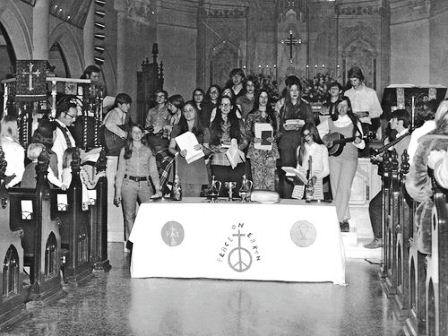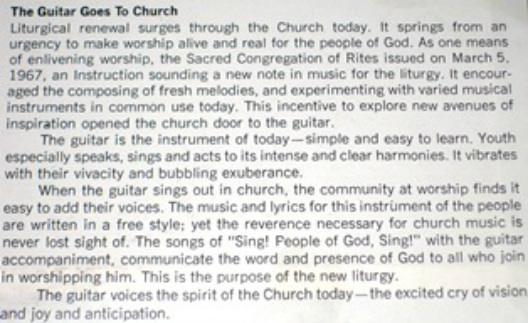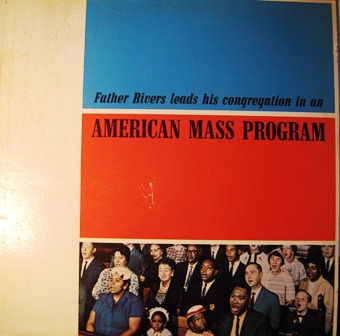Wanted:
I am looking for a copy of "Sons of God hear His holy word" by James Thiem and cannot find it anywhere. I believe it is on the 1965 Mass For Young Americans album by Ray Repp. I am wondering though if James Thiem ever released it on one of his albums as well. Does anyone know why it may be so difficult to find his music? If you have a copy of the Mass for Young Americans I would be interested in buying or renting it. Please enter feedback below.
What:
What: Cool FolkMass picture circa 1970's
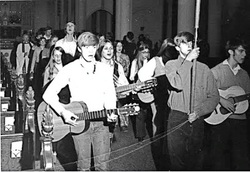
Found this picture on the internet. Can anyone give any details about it?
Who: Quick bio of Ray Repp and Msgr. Joseph W. James
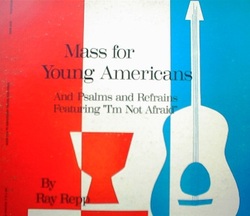
By Jessica Kelly
Catholic News Service
SLATON, Texas (CNS) -- If Ray Repp, of "Allelu!" and "Peace, My Friends" fame, can be considered the founding father of contemporary Catholic music, then Msgr. Joseph W. James can lay claim to the title of the music's "godfather."
Born in Dalhart and raised on a large ranch where he worked as a cowboy, Msgr. James was ordained for the Diocese of Amarillo in 1957. He became a priest of the Diocese of Lubbock, when it was created out of the Amarillo Diocese in 1983.
Now retired, Msgr. James has had a prophetic and productive life of ministry.
Msgr. James baptized Buddy Holly's drummer into the Catholic Church so the young man could marry the "Peggy Sue" that Holly sang about, but it's the priest's influence on liturgical music that will be his legacy.
In the early 1960s, before the Second Vatican Council (1962-65) brought changes to the church, the Mass was in Latin. There was sometimes a choir, usually with an organ played as an accompaniment. The thought of using a guitar at Mass was practically blasphemous.
In the summer of 1964, then-Father James was at the University of Notre Dame, in Indiana, in a class with Father Clarence Rivers, a young priest from the Archdiocese of Cincinnati. Their professor challenged Father Rivers to write a song for Mass in the vernacular, the language of the people.
So impressed was he by the song Father Rivers wrote -- "God Is Love" -- and songs he heard at nearby hootenannies, Msgr. James gathered them in a songbook, printed copies and organized a singalong at Notre Dame.
Soon, groups of students -- many of whom were women religious -- were gathering to sing, pray and worship on Saturday evenings. He called his songbook "Hymnanny for Hootenunnies."
In 1965, while helping with a three-week training session in Chicago for the Catholic Church Extension Society's lay volunteer program, Msgr. James encountered singalongs led by a young man who played guitar and taught participants songs he had written.
"I had a trusty little reel-to-reel tape recorder that I used to carry around so I could record anything of note," said Msgr. James. "This guy was singing some songs that I thought were really great. So I recorded them."
The "guy" was Repp, a seminarian on leave to serve as an Extension volunteer.
Each night, the volunteers would gather for Mass before dinner. After the first evening of what Repp remembers as a "ho-hum," quiet Mass, he asked the celebrant, "Do you mind if we have some music tomorrow?"
The priest -- Msgr. John May, later to become archbishop of St. Louis -- agreed, and Repp began introducing his "folk Mass" music to the other volunteers, leading them in familiar songs and creating more along the way.
Many volunteers requested something to take with them as they dispersed throughout the country. Repp, however, had never written down any of his music.
"In fact," he said, "I hardly knew how to write stuff down, and so two or three people who knew more about music than I did spent an evening or two literally writing it down for the first time." He and his friends then made up booklets of his music on a "ditto" machine to give to the volunteers.
"It was somewhere around this particular period of time that Joe James must have come to some of these things, and he said, 'You know, I think we should put some of this on tape,'" said Repp. "So we recorded this tape, and Joe made this tape available to a lot of people, so when we were commissioned and went out, everybody not only had a physical copy of the music we'd been singing, they also had Joe's tapes."
Father James asked for an endorsement of the music from Bishop Victor Reed of Oklahoma City, who happened to be in Chicago at the time. The bishop agreed, so a label was attached to each tape reading "This has been approved by the bishop of Oklahoma City."
"I took one of (Repp's) tapes to Dennis Fitzpatrick, who had an office there in Chicago, Friends of the English Liturgy, FEL," Msgr. James told the South Plains Catholic, Lubbock's diocesan newspaper. "I gave him the tape and said, 'I think it's pretty good stuff, and the bishop of Oklahoma City approved of it."
Within three months, Fitzpatrick called Repp, asking him to come back to Chicago to record an album.
He recorded "Mass for Young Americans," the first album of its kind and the inspiration for an entirely new genre of Catholic music.
Father James did not stop there. The next summer, he was at school in Chicago again, still carrying around his reel-to-reel recorder.
"I'd record anything that people that were going to summer school had written," he said. Father James sent about 10 people to Fitzpatrick, who put them in Friends of the English Liturgy's 1966 "Hymnal for Young Christians."
Msgr. James also boosted the career of Sebastian Temple, who wrote "Prayer of St. Francis," by introducing him to Omer Westendorf, founder of World Library of Sacred Music and publisher of "The People's Mass Book."
The priest takes no credit for his role.
"It was something that I enjoyed and promoted," he said. "I never got a penny out of it, or royalty, or anything else. I didn't think about it as breaking new ground, it just seemed helpful and needed to be promoted."
END of Texas priest seen as 'godfather' of nascent liturgical music movement.
_
Catholic News Service
SLATON, Texas (CNS) -- If Ray Repp, of "Allelu!" and "Peace, My Friends" fame, can be considered the founding father of contemporary Catholic music, then Msgr. Joseph W. James can lay claim to the title of the music's "godfather."
Born in Dalhart and raised on a large ranch where he worked as a cowboy, Msgr. James was ordained for the Diocese of Amarillo in 1957. He became a priest of the Diocese of Lubbock, when it was created out of the Amarillo Diocese in 1983.
Now retired, Msgr. James has had a prophetic and productive life of ministry.
Msgr. James baptized Buddy Holly's drummer into the Catholic Church so the young man could marry the "Peggy Sue" that Holly sang about, but it's the priest's influence on liturgical music that will be his legacy.
In the early 1960s, before the Second Vatican Council (1962-65) brought changes to the church, the Mass was in Latin. There was sometimes a choir, usually with an organ played as an accompaniment. The thought of using a guitar at Mass was practically blasphemous.
In the summer of 1964, then-Father James was at the University of Notre Dame, in Indiana, in a class with Father Clarence Rivers, a young priest from the Archdiocese of Cincinnati. Their professor challenged Father Rivers to write a song for Mass in the vernacular, the language of the people.
So impressed was he by the song Father Rivers wrote -- "God Is Love" -- and songs he heard at nearby hootenannies, Msgr. James gathered them in a songbook, printed copies and organized a singalong at Notre Dame.
Soon, groups of students -- many of whom were women religious -- were gathering to sing, pray and worship on Saturday evenings. He called his songbook "Hymnanny for Hootenunnies."
In 1965, while helping with a three-week training session in Chicago for the Catholic Church Extension Society's lay volunteer program, Msgr. James encountered singalongs led by a young man who played guitar and taught participants songs he had written.
"I had a trusty little reel-to-reel tape recorder that I used to carry around so I could record anything of note," said Msgr. James. "This guy was singing some songs that I thought were really great. So I recorded them."
The "guy" was Repp, a seminarian on leave to serve as an Extension volunteer.
Each night, the volunteers would gather for Mass before dinner. After the first evening of what Repp remembers as a "ho-hum," quiet Mass, he asked the celebrant, "Do you mind if we have some music tomorrow?"
The priest -- Msgr. John May, later to become archbishop of St. Louis -- agreed, and Repp began introducing his "folk Mass" music to the other volunteers, leading them in familiar songs and creating more along the way.
Many volunteers requested something to take with them as they dispersed throughout the country. Repp, however, had never written down any of his music.
"In fact," he said, "I hardly knew how to write stuff down, and so two or three people who knew more about music than I did spent an evening or two literally writing it down for the first time." He and his friends then made up booklets of his music on a "ditto" machine to give to the volunteers.
"It was somewhere around this particular period of time that Joe James must have come to some of these things, and he said, 'You know, I think we should put some of this on tape,'" said Repp. "So we recorded this tape, and Joe made this tape available to a lot of people, so when we were commissioned and went out, everybody not only had a physical copy of the music we'd been singing, they also had Joe's tapes."
Father James asked for an endorsement of the music from Bishop Victor Reed of Oklahoma City, who happened to be in Chicago at the time. The bishop agreed, so a label was attached to each tape reading "This has been approved by the bishop of Oklahoma City."
"I took one of (Repp's) tapes to Dennis Fitzpatrick, who had an office there in Chicago, Friends of the English Liturgy, FEL," Msgr. James told the South Plains Catholic, Lubbock's diocesan newspaper. "I gave him the tape and said, 'I think it's pretty good stuff, and the bishop of Oklahoma City approved of it."
Within three months, Fitzpatrick called Repp, asking him to come back to Chicago to record an album.
He recorded "Mass for Young Americans," the first album of its kind and the inspiration for an entirely new genre of Catholic music.
Father James did not stop there. The next summer, he was at school in Chicago again, still carrying around his reel-to-reel recorder.
"I'd record anything that people that were going to summer school had written," he said. Father James sent about 10 people to Fitzpatrick, who put them in Friends of the English Liturgy's 1966 "Hymnal for Young Christians."
Msgr. James also boosted the career of Sebastian Temple, who wrote "Prayer of St. Francis," by introducing him to Omer Westendorf, founder of World Library of Sacred Music and publisher of "The People's Mass Book."
The priest takes no credit for his role.
"It was something that I enjoyed and promoted," he said. "I never got a penny out of it, or royalty, or anything else. I didn't think about it as breaking new ground, it just seemed helpful and needed to be promoted."
END of Texas priest seen as 'godfather' of nascent liturgical music movement.
_
Father Clarence Rivers September 9, 1931 - November 21, 2004
Your browser does not support viewing this document. Click here to download the document.
Your browser does not support viewing this document. Click here to download the document.
Your browser does not support viewing this document. Click here to download the document.
google-site-verification: googlec9d6170c6697323e.html
